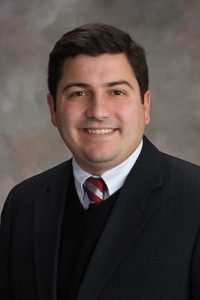Modification, elimination of state boards and commissions proposed
The Government, Military and Veterans Affairs Committee heard testimony Feb. 23 on a bill that would modify and eliminate various state-established boards and commissions.

Gretna Sen. John Murante said LB644, introduced on behalf of the committee, was the result of a statutorily-required review of all state boards and commissions undertaken by the committee every four years. The review examined approximately 200 entities, he said, and is designed to determine which of them should be modified or eliminated.
“[We] solicit feedback and basically ask everyone to justify their existence,” Murante said, noting that the bill would modify or delete from state law 25 boards and commissions.
Testimony focused on proposed changes to three judicial commissions.
Murante said the commissions were included in the bill because the judicial branch did not respond to the committee’s request for information due to separation of powers concerns.
Traditionally, he said, the committee eliminates boards that do not respond. However, two of the judicial commissions are set forth in the state constitution and cannot be eliminated without a constitutional amendment, he said, so LB644 instead would modify them.
“There was no choice but to create modifications while adhering to the legislative tradition of the Government, Military and Veterans Affairs Committee,” Murante said.
The bill would make changes to the Judicial Qualifications Commission, which investigates complaints regarding Nebraska judges’ actions and qualifications. The commission currently includes the chief justice of the Nebraska Supreme Court, three judges appointed by the chief justice, three members of the Nebraska State Bar Association appointed by the association’s executive council and three lay members appointed by the governor.
LB644 would require that a majority of the members appointed by the governor be present in order to achieve a quorum, and be required to agree before any action could be taken by the commission.
Terry Wittler, testifying on behalf of the Nebraska State Bar Association, opposed the changes, which he said would complicate the commissions’ work and could violate state constitutional provisions requiring a simple majority for the commission to act.
“The [commission] meets six times a year and many laypersons would not be able to commit to attend every meeting,” Wittler said, adding that requiring them to do so would limit the number of people who would consider serving on the commission.
The bill also would make changes to the Judicial Nominating Commissions, which select qualified candidates for consideration by the governor to fill judicial vacancies.
LB644 would require that all lay members of the Judicial Nominating Commissions be affiliated with the same political party as the governor. The bill also would remove current requirements that:
• members be limited to eight consecutive years of membership;
• alternates to the commission not be members of the same political party;
• no more than two lawyer members be registered members of the same political party; and
• lawyer members of the commission be members of the Nebraska bar and reside in the judicial district served by the commission.
The bill would allow the governor, rather than the executive council of the Nebraska State Bar Association, to nominate lawyer members to the commission if an insufficient number of solicited nominations for vacancies are received. The bill also would require that all meeting and communications of the commission be public.
Ted Kessner, representing the Nebraska State Bar Association, opposed the changes, noting in particular the public record requirements.
A great deal of sensitive information — including financial and medical records — often is part of the review process for potential judges, he said, and should not be made public. In addition, he said, applicants for judgeships may not want to reveal their intentions for personal and professional reasons and commission members need to be able to engage in frank discussions regarding applicants.
“If you make all of this information public it will have a chilling effect on people applying for judgeships,” Kessner said.
The bill also would eliminate the Judicial Resources Commission. Under current law, when a district or county judge leaves office, or if there is a need to change the boundaries or number of judicial districts or judgeships, the commission holds a public hearing and makes a recommendation to the Legislature.
LB644 would eliminate the commission and place its responsibilities with the Nebraska Supreme Court.
Tim Engler, representing the Nebraska State Bar Association, testified in opposition to eliminating the commission, which he called a valuable resource for balancing judgeships and judicial needs.
“That’s a difficult challenge in this state because of our urban/rural makeup,” he said. “We want to make sure that our limited judicial resources are spread out across the state in a way that gives everyone equal access to justice.”
Finally, among other boards and commissions, the bill would eliminate the following:
• Health Advisory Board;
• Nursing Home Advisory Board;
• Community Gardens Task Force;
• Perfusionist Committee;
• Stem Cell Research Advisory Committee;
• Carbon Sequestration Advisory Committee;
• Nebraska Potato Development Committee;
• Health Care Database Advisory Committee;
• Exchange Stakeholder Commission;
• Medicaid Reform Council;
• Aging Nebraskans Task Force; and
• Out of Home Data Pilot Project Advisory Group.
Murante said an amendment would be offered to remove certain entities from the bill that had indicated incorrectly that they were no longer functional or necessary, including the Critical Incident Stress Management Council and the Board of Emergency Medical Services.
No one testified in support of LB644 and the committee took no immediate action on the bill.

